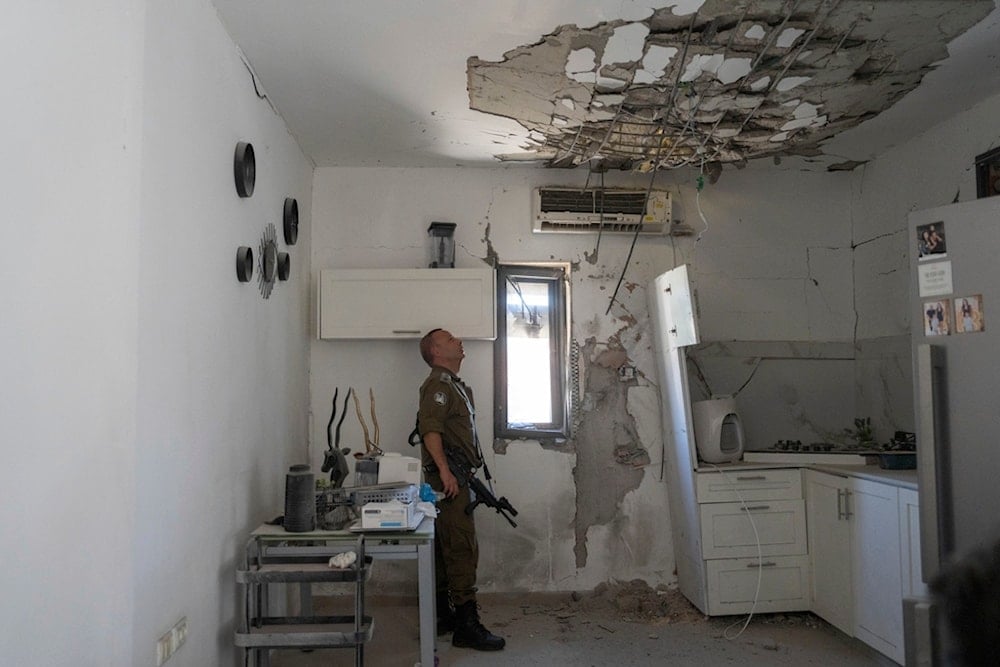One in ten Israeli hotels on brink of going under: Israeli media
Hotels and guesthouses along the northern border have been closed for ten months since the war on Gaza began.
-

An Israeli army officer shows damage inside a house in Kiryat Shmona, which was hit by a missile fired from Lebanon a few weeks ago, on Sunday, June 16, 2024. (AP)
A report released by the Israel Hotel Association (IHA) on Wednesday indicated that almost 10% of hotels in the Israeli occupation are in serious danger of collapsing, with many others on the verge of financial disaster, Israeli Ynet news revealed.
The report details hotel occupancy rates across occupied Palestine from January to June 2024 and showcases serious financial difficulties in locations reliant on inbound tourists, whilst communities hosting evacuated settlers and relying on domestic tourism, including the Dead Sea and Eilat, reported strong occupancy rates.
Hotels and guesthouses along the northern border have been closed for ten months since the war on Gaza began, amid Hezbollah's operations in support of Palestine.
Sivan Detauker, CEO of IHA, which represents 450 hotels across the entity and employs approximately 42,000 people stated that the hotel industry is a "strategic asset" for "Israel,", adding that all "relevant parties must work together" to stop the closures.
Detauker noted the critical role of hotels since the onslaught on Gaza began, where tens of thousands of Israelis have been evacuated. She emphasized the considerable staff shortages and economic instability that limit the sector's capacity to plan for the future.
Roughly 969,000 tourist overnight stays were recorded in the first half of 2024, representing an 81% year-on-year fall and an 84% decrease over the same time in 2019.
The Tourism Ministry recorded around 500,000 visitors to occupied Palestine between January and June, compared to almost two million over the same time the previous year.
In contrast, Israeli overnight stays were 10.4 million, a 53% increase over the same time the previous year, with half involving evacuees. During the first quarter, many evacuees from the south left hotels, leaving largely evacuees from the north.
As a result, above-average occupancy rates were seen in areas housing northern evacuees, such as Haifa, Tiberias, Netanya, and Herzliya, with the overall hotel occupancy rate standing at 62%, compared to 63% in 2023 and 68% in 2019.
Tel Aviv recorded a 57% occupancy rate, an 11% decrease compared to last year, and a 25% decrease compared to 2019.
In occupied al-Quds, the occupancy rate was 41%, a 37% decrease compared to last year and a 43% decrease compared to 2019, while al-Nasira recorded 33%, a 40% decrease compared to last year and a 52% decrease compared to 2019.
Up to 60,000 war-affected Israeli businesses may shut down in 2024
Meanwhile, Israeli businesses are expected to grapple with the repercussions of the months-long war on Gaza at least until the end of the year, with projections indicating up to 60,000 business closures in 2024, The Times of Israel reported, citing business information company CofaceBDI.
This forecast follows the closure of 46,000 businesses over the past nine months, attributed to the consequences of the ongoing war, the news website pointed out.
It noted that many businesses have been severely impacted by high interest rates, costly financing, manpower shortages, significant drops in revenue and operations, logistical disruptions, and insufficient government support.
For comparison, a record 76,000 businesses closed during the 2020 coronavirus pandemic, while in a typical year, around 40,000 businesses shut down, the Israeli website highlighted.
CofaceBDI CEO Yoel Amir told The Times of Israel that no sector in the economy is immune to the repercussions of the ongoing war.
He explained that businesses are facing a "very complex reality: fear about an escalation of the war coupled with uncertainty about when the fighting will end alongside continued challenges such as staff shortage, low demand, growing financing needs, an increase in procurement costs and logistical issues."
He added that all these factors, along with the recent export ban by Turkey, further exacerbate the difficulties for Israeli businesses during this period.
Amir indicated that approximately 77% of the businesses that closed since the beginning of the war, around 35,000 enterprises, are small businesses with up to five employees. These businesses are the "most vulnerable", having immediate financing needs when their operations are disrupted and facing difficulties raising essential funds.

 4 Min Read
4 Min Read








